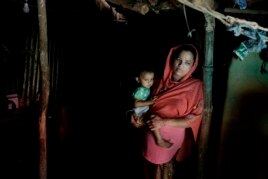10 October, 2018
Rahima Akter is a 19-year-old ethnic Rohingya who lives in a refugee camp in southern Bangladesh. Many other Rohingya women her age have children. But Aktar has other plans right now. She says her goal is to be the most educated Rohingya woman in the world.
Akter was born in the refugee camp and lived there most of her life.
The homes in the camp are simple. They are made of bamboo with cloth coverings. These living places are spread over an area that once was protected forestland.
He parents were among an estimated 250,000 Rohingya Muslims who fled attacks by the Buddhist majority in Myanmar in the early 1990s when the country was known as Burma.
Akter said education is the best way to improve her people's living conditions. "If we take education then we will be able to lead our life as a life," she said.
Already, the young woman has made learning pay off for her and her family. She has increased her family's income by working as a translator for aid groups and reporters. They are trying to find out more about the latest wave of Rohingya refugees who have come to the area since August 2017.
At that time, reports say, the Myanmar military and Buddhist groups began "clearance operations" against the Rohingya. The violent campaign answered rebel attacks on security stations in Myanmar's Rakhine state. It caused hundreds of thousands more Rohingya to flee Myanmar for Bangladesh.
The United Nations released a report last month by a group of investigators. That report said at least 10,000 Rohingya are believed to have died as a result of the campaign of violence. The U.N. also called for top military leaders in Myanmar to face charges of crimes against humanity.
Seeking an education
Rohingya refugees have found some safety in southern Bangladesh.
However, an education is difficult to get in camp conditions.
More than 1,000 temporary schools teach English, Burmese, math, science and the arts to about 140,000 children ages 6 to 14. However, an estimated 500,000 children live in the camps. As a result, the UN children's agency UNICEF says only about one in four goes to school. And, the education program lasts only about five years. Because of the limited opportunities for education, UNICEF calls the refugee children "a lost generation."
A UNICEF spokesman said, "The international community has failed these children."
To get an education, Akter had to leave the camps and secretly enroll in Bangladeshi schools. She is one of a few Rohingya refugee girls who have completed what is equal to high school in Bangladesh. To reach that goal, she had to cross the camp security checkpoints and bribe Bangladeshi public school officials. Akter said she also had to make herself look like a Bangladeshi girl and speak only Bengali, the official language of Bangladesh.

In this Aug. 27, 2018, photo, Rohingya refugee woman Minara Begum, mother of Rahima Akter, holds her youngest daughter Arohi Zannat inside the family hut in Kutupalong refugee camp, Bangladesh.
Her family also opposed her efforts to get an education. Most Rohingya girls are expected to get married by the age of 16, or as early as 14. Akter begged her parents to let her continue her studies.
Akter's mother, Minara Begum, supported her daughter's desire for an education, even though elders in her community opposed it. Begum fled Myanmar as a child and never attended school. She said, "If I can help my children get a better future by education, then that is what I am going to do."
Begum now sends three of her daughters to school. She hopes to send her son and youngest daughter as well.
Akter and two of her sisters live on their own near the school in the town of Cox's Bazar, about a two-hour trip from the camp.
Begum said that her family has cut its food costs to pay for the school in hopes that an education will build a better future.
Begum's efforts appear to be bearing fruit. Akter now earns more money than the rest of her family. She is now preparing applications so she can attend a university.
She also spends time going from house to house documenting the stories of people who fled Myanmar last year. She hopes to publish her research when she is in college. Her goal is to study human rights.
Akter told the AP, "Why do people have to lead their lives in such a situation?" She added, "One day maybe I'll be able to raise up my voice about human rights for the Rohingya."
I'm Mario Ritter.
Mario Ritter adapted this story for VOA Learning English from VOA News, AP, Reuters and the Nobel site. Kelly Jean Kelly was the editor.
_____________________________________________________________
Words in This Story
translator –n. a person who changes words in one language into a different language
bribe –v. to try to get someone to do something by giving or promising something valuable; to offer a bribe to someone
document –v. to create a record of something though writing, film, photography
We want to hear from you. Write to us in the Comments section, and visit 51VOA.COM.